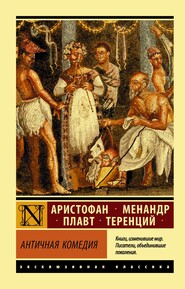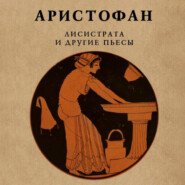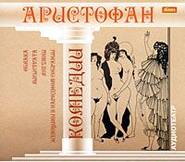По всем вопросам обращайтесь на: info@litportal.ru
(©) 2003-2024.
✖
The Eleven Comedies, Volume 1
Автор
Год написания книги
2018
Настройки чтения
Размер шрифта
Высота строк
Поля
FIRST SEMI-CHORUS. But though it be true, need he say it? But you'll have no great cause to be proud of your insolence!
SECOND SEMI-CHORUS. Where are you running to? Don't you move; if you strike this man I shall be at you.
FIRST SEMI-CHORUS. Lamachus, whose glance flashes lightning, whose plume petrifies thy foes, help! Oh! Lamachus, my friend, the hero of my tribe and all of you, both officers and soldiers, defenders of our walls, come to my aid; else is it all over with me!
LAMACHUS. Whence comes this cry of battle? where must I bring my aid? where must I sow dread? who wants me to uncase my dreadful Gorgon's head?[218 - A figure of Medusa's head, forming the centre of Lamachus' shield.]
DICAEOPOLIS. Oh, Lamachus, great hero! Your plumes and your cohorts terrify me.
CHORUS. This man, Lamachus, incessantly abuses Athens.
LAMACHUS. You are but a mendicant and you dare to use language of this sort?
DICAEOPOLIS. Oh, brave Lamachus, forgive a beggar who speaks at hazard.
LAMACHUS. But what have you said? Let us hear.
DICAEOPOLIS. I know nothing about it; the sight of weapons makes me dizzy. Oh! I adjure you, take that fearful Gorgon somewhat farther away.
LAMACHUS. There.
DICAEOPOLIS. Now place it face downwards on the ground.
LAMACHUS. It is done.
DICAEOPOLIS. Give me a plume out of your helmet.
LAMACHUS. Here is a feather.
DICAEOPOLIS. And hold my head while I vomit; the plumes have turned my stomach.
LAMACHUS. Hah! what are you proposing to do? do you want to make yourself vomit with this feather?
DICAEOPOLIS. Is it a feather? what bird's? a braggart's?
LAMACHUS. Ah! ah! I will rip you open.
DICAEOPOLIS. No, no, Lamachus! Violence is out of place here! But as you are so strong, why did you not circumcise me? You have all you want for the operation there.
LAMACHUS. A beggar dares thus address a general!
DICAEOPOLIS. How? Am I a beggar?
LAMACHUS. What are you then?
DICAEOPOLIS. Who am I? A good citizen, not ambitious; a soldier, who has fought well since the outbreak of the war, whereas you are but a vile mercenary.
LAMACHUS. They elected me….
DICAEOPOLIS. Yes, three cuckoos did![219 - Indicates the character of his election, which was arranged, so Aristophanes implies, by his partisans.] If I have concluded peace, 'twas disgust that drove me; for I see men with hoary heads in the ranks and young fellows of your age shirking service. Some are in Thrace getting an allowance of three drachmae, such fellows as Tisameophoenippus and Panurgipparchides. The others are with Chares or in Chaonia, men like Geretotheodorus and Diomialazon; there are some of the same kidney, too, at Camarina and at Gela,[220 - Towns in Sicily. There is a pun on the name Gela—[Greek: Gela] and [Greek: Katagela] (ridiculous)—which it is impossible to keep in English. Apparently the Athenians had sent embassies to all parts of the Greek world to arrange treaties of alliance in view of the struggle with the Lacedaemonians; but only young debauchees of aristocratic connections had been chosen as envoys.] the laughing-stock of all and sundry.
LAMACHUS. They were elected.
DICAEOPOLIS. And why do you always receive your pay, when none of these others ever get any? Speak, Marilades, you have grey hair; well then, have you ever been entrusted with a mission? See! he shakes his head. Yet he is an active as well as a prudent man. And you, Dracyllus, Euphorides or Prinides, have you knowledge of Ecbatana or Chaonia? You say no, do you not? Such offices are good for the son of Caesyra[221 - A contemporary orator apparently, otherwise unknown.] and Lamachus, who, but yesterday ruined with debt, never pay their shot, and whom all their friends avoid as foot passengers dodge the folks who empty their slops out of window.
LAMACHUS. Oh! in freedom's name! are such exaggerations to be borne?
DICAEOPOLIS. Lamachus is well content; no doubt he is well paid, you know.
LAMACHUS. But I propose always to war with the Peloponnesians, both at sea, on land and everywhere to make them tremble, and trounce them soundly.
DICAEOPOLIS. For my own part, I make proclamation to all Peloponnesians, Megarians and Boeotians, that to them my markets are open; but I debar Lamachus from entering them.
CHORUS. Convinced by this man's speech, the folk have changed their view and approve him for having concluded peace. But let us prepare for the recital of the parabasis.[222 - The parabasis in the Old Comedy was a sort of address or topical harangue addressed directly by the poet, speaking by the Chorus, to the audience. It was nearly always political in bearing, and the subject of the particular piece was for the time being set aside altogether.]
Never since our poet presented Comedies, has he praised himself upon the stage; but, having been slandered by his enemies amongst the volatile Athenians, accused of scoffing at his country and of insulting the people, to-day he wishes to reply and regain for himself the inconstant Athenians. He maintains that he has done much that is good for you; if you no longer allow yourselves to be too much hoodwinked by strangers or seduced by flattery, if in politics you are no longer the ninnies you once were, it is thanks to him. Formerly, when delegates from other cities wanted to deceive you, they had but to style you, "the people crowned with violets," and, at the word "violets" you at once sat erect on the tips of your bums. Or, if to tickle your vanity, someone spoke of "rich and sleek Athens," in return for that 'sleekness' he would get all, because he spoke of you as he would have of anchovies in oil. In cautioning you against such wiles, the poet has done you great service as well as in forcing you to understand what is really the democratic principle. Thus, the strangers, who came to pay their tributes, wanted to see this great poet, who had dared to speak the truth to Athens. And so far has the fame of his boldness reached that one day the Great King, when questioning the Lacedaemonian delegates, first asked them which of the two rival cities was the superior at sea, and then immediately demanded at which it was that the comic poet directed his biting satire. "Happy that city," he added, "if it listens to his counsel; it will grow in power, and its victory is assured." This is why the Lacedaemonians offer you peace, if you will cede them Aegina; not that they care for the isle, but they wish to rob you of your poet.[223 - It will be remembered that Aristophanes owned land in Aegina.] As for you, never lose him, who will always fight for the cause of justice in his Comedies; he promises you that his precepts will lead you to happiness, though he uses neither flattery, nor bribery, nor intrigue, nor deceit; instead of loading you with praise, he will point you to the better way. I scoff at Cleon's tricks and plotting; honesty and justice shall fight my cause; never will you find me a political poltroon, a prostitute to the highest bidder.
I invoke thee, Acharnian Muse, fierce and fell as the devouring fire; sudden as the spark that bursts from the crackling oaken coal when roused by the quickening fan to fry little fishes, while others knead the dough or whip the sharp Thasian pickle with rapid hand, so break forth, my Muse, and inspire thy tribesmen with rough, vigorous, stirring strains.
We others, now old men and heavy with years, we reproach the city; so many are the victories we have gained for the Athenian fleets that we well deserve to be cared for in our declining life; yet far from this, we are ill-used, harassed with law-suits, delivered over to the scorn of stripling orators. Our minds and bodies being ravaged with age, Posidon should protect us, yet we have no other support than a staff. When standing before the judge, we can scarcely stammer forth the fewest words, and of justice we see but its barest shadow, whereas the accuser, desirous of conciliating the younger men, overwhelms us with his ready rhetoric; he drags us before the judge, presses us with questions, lays traps for us; the onslaught troubles, upsets and rends poor old Tithonus, who, crushed with age, stands tongue-tied; sentenced to a fine,[224 - Everything was made the object of a law-suit at Athens. The old soldiers, inexpert at speaking, often lost the day.] he weeps, he sobs and says to his friend, "This fine robs me of the last trifle that was to have bought my coffin."
Is this not a scandal? What! the clepsydra[225 - A water-clock used to limit the length of speeches in the courts.] is to kill the white-haired veteran, who, in fierce fighting, has so oft covered himself with glorious sweat, whose valour at Marathon saved the country! 'Twas we who pursued on the field of Marathon, whereas now 'tis wretches who pursue us to the death and crush us! What would Marpsias reply to this?[226 - A braggart speaker, fiery and pugnacious.] What an injustice, that a man, bent with age like Thucydides, should be brow-beaten by this braggart advocate, Cephisodemus,[227 - Cephisodemus was an Athenian, but through his mother possessed Scythian blood.] who is as savage as the Scythian desert he was born in! Is it not to convict him from the outset? I wept tears of pity when I saw an Archer[228 - The city of Athens was policed by Scythian archers.] maltreat this old man, who, by Ceres, when he was young and the true Thucydides, would not have permitted an insult from Ceres herself! At that date he would have floored ten miserable orators, he would have terrified three thousand Archers with his shouts; he would have pierced the whole line of the enemy with his shafts. Ah! but if you will not leave the aged in peace, decree that the advocates be matched; thus the old man will only be confronted with a toothless greybeard, the young will fight with the braggart, the ignoble with the son of Clinias[229 - Alcibiades.]; make a law that in future, the old man can only be summoned and convicted at the courts by the aged and the young man by the youth.
DICAEOPOLIS. These are the confines of my market-place. All Peloponnesians, Megarians, Boeotians, have the right to come and trade here, provided they sell their wares to me and not to Lamachus. As market-inspectors I appoint these three whips of Leprean[230 - The leather market was held at Lepros, outside the city.] leather, chosen by lot. Warned away are all informers and all men of Phasis.[231 - Meaning an informer ([Greek: phain_o], to denounce).] They are bringing me the pillar on which the treaty is inscribed[232 - According to the Athenian custom.] and I shall erect it in the centre of the market, well in sight of all.
A MEGARIAN. Hail! market of Athens, beloved of Megarians. Let Zeus, the patron of friendship, witness, I regretted you as a mother mourns her son. Come, poor little daughters of an unfortunate father, try to find something to eat; listen to me with the full heed of an empty belly. Which would you prefer? To be sold or to cry with hunger.
DAUGHTERS. To be sold, to be sold!
MEGARIAN. That is my opinion too. But who would make so sorry a deal as to buy you? Ah! I recall me a Megarian trick; I am going to disguise you as little porkers, that I am offering for sale. Fit your hands with these hoofs and take care to appear the issue of a sow of good breed, for, if I am forced to take you back to the house, by Hermes! you will suffer cruelly of hunger! Then fix on these snouts and cram yourselves into this sack. Forget not to grunt and to say wee-wee like the little pigs that are sacrificed in the Mysteries. I must summon Dicaeopolis. Where is he? Dicaeopolis, will you buy some nice little porkers?
DICAEOPOLIS. Who are you? a Megarian?
MEGARIAN. I have come to your market.
DICAEOPOLIS. Well, how are things at Megara?[233 - Megara was allied to Sparta and suffered during the war more than any other city, because of its proximity to Athens.]
MEGARIAN. We are crying with hunger at our firesides.
DICAEOPOLIS. The fireside is jolly enough with a piper. But what else is doing at Megara, eh?
MEGARIAN. What else? When I left for the market, the authorities were taking steps to let us die in the quickest manner.
DICAEOPOLIS. That is the best way to get you out of all your troubles.
MEGARIAN. True.
DICAEOPOLIS. What other news of Megara? What is wheat selling at?











